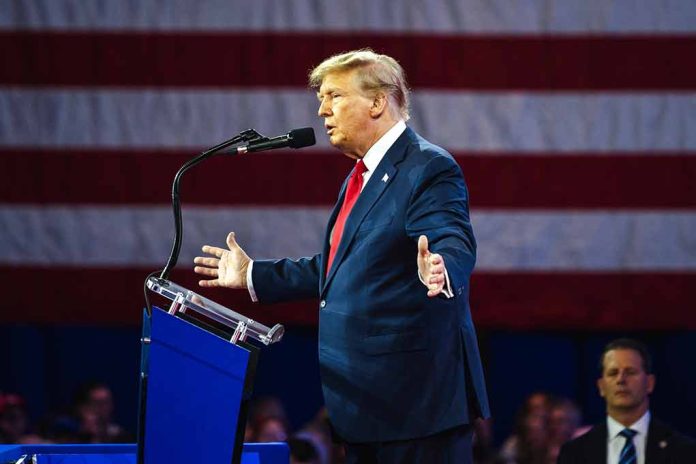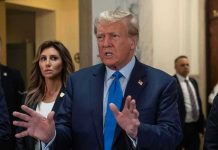
President Trump escalates trade tensions with Canada by doubling tariffs on steel and aluminum to 50% while proposing Canada become the 51st state amid an electricity dispute that sent markets tumbling.
Key Takeaways
- Trump raised tariffs on Canadian steel and aluminum from 25% to 50% in retaliation for Ontario’s 25% tariff on electricity exports to the US.
- The President threatened additional tariffs on Canadian automotive exports that could “permanently shut down” Canada’s auto industry if other tariffs aren’t dropped.
- Trump formally proposed Canada become the 51st US state, claiming it would eliminate tariffs and improve security.
- Financial markets reacted negatively with the Dow Jones dropping over 500 points following the announcement.
- Both Canadian Prime Minister Justin Trudeau and incoming PM Mark Carney firmly rejected Trump’s annexation suggestion.
Tariff War Escalates Over Energy Dispute
President Trump has ordered the Commerce Department to increase tariffs on Canadian steel and aluminum imports by an additional 25%, bringing the total to 50%. The action comes in direct response to Ontario’s 25% tariff on electricity exports to the United States. The new tariffs, set to take effect on March 12th, represent a significant escalation in trade tensions between the traditionally close allies. Trump also demanded Canada drop its high tariffs on US dairy products, signaling a broader trade dispute beyond the energy sector.
The President further announced that his administration is declaring a National Emergency regarding electricity trade with Canada. Ontario Premier Doug Ford has publicly stated he intends to maintain the electricity tax despite Trump’s retaliatory measures, describing the US response as an “unprovoked attack.” This electricity dispute has quickly evolved into a multi-sector trade conflict with potential far-reaching economic consequences for both nations.
Trump just announced CANADA WITH A 50% TARIFF on STEEL & ALUMINUM after Ontario’s 25% ELECTRICITY TARIFF on the U.S.
He warns of a National Emergency and hints at making CANADA the 51ST STATE
Auto tariffs could be next on April 2nd 
He is not playing around folks pic.twitter.com/iF3EokbyFD
— 🌸 Digi Gal (@DigitalGal_) March 11, 2025
Auto Industry Threats and Market Impact
In a move that heightened tensions further, President Trump threatened even more severe consequences if Canada fails to drop its tariffs. “If other egregious, long time Tariffs are not likewise dropped by Canada, I will substantially increase, on April 2nd, the Tariffs on Cars coming into the U.S. which will, essentially, permanently shut down the automobile manufacturing business in Canada,” Trump stated. This threat directly targets one of Canada’s largest industries and has created significant economic uncertainty.
The financial markets reacted swiftly to the escalating trade tensions. The Dow Jones Industrial Average fell more than 500 points as investors evaluated the potential economic fallout from the tariff increases. The Canadian dollar also tumbled against the US dollar, reflecting concerns about the impact on Canada’s export-dependent economy. April 2nd has been established as the deadline for imposing additional “reciprocal tariffs” on countries with duties on US goods, potentially expanding the scope of the trade conflict.
The 51st State Proposal
President Trump formally proposed that Canada become the 51st US state. “The only thing that makes sense is for Canada to become our cherished Fifty First State,” Trump declared. He argued that Canada relies heavily on US military protection and would see significant financial benefits by joining the United States. The President suggested this arrangement would eliminate tariffs and improve security and economic conditions for Canadians.
Canadian leadership firmly rejected the proposition. Current Prime Minister Justin Trudeau accused Trump of attempting to weaken Canada for annexation purposes. Incoming Prime Minister Mark Carney was equally unambiguous, stating, “America is not Canada, and Canada never, ever, will be part of America in any way, shape or form.” Trump also claimed the tariffs were partly aimed at stopping fentanyl trafficking while acknowledging the potential economic impacts, and accused Trudeau of using the tariff situation for political gain ahead of Canada’s leadership transition.
Sources:
Trump Reconsiders Canada Tariffs After Ontario Folds, Suspends Electricity Surcharge
Trump will not impose 50% Canadian steel, aluminum tariffs tomorrow, says top trade advisor



